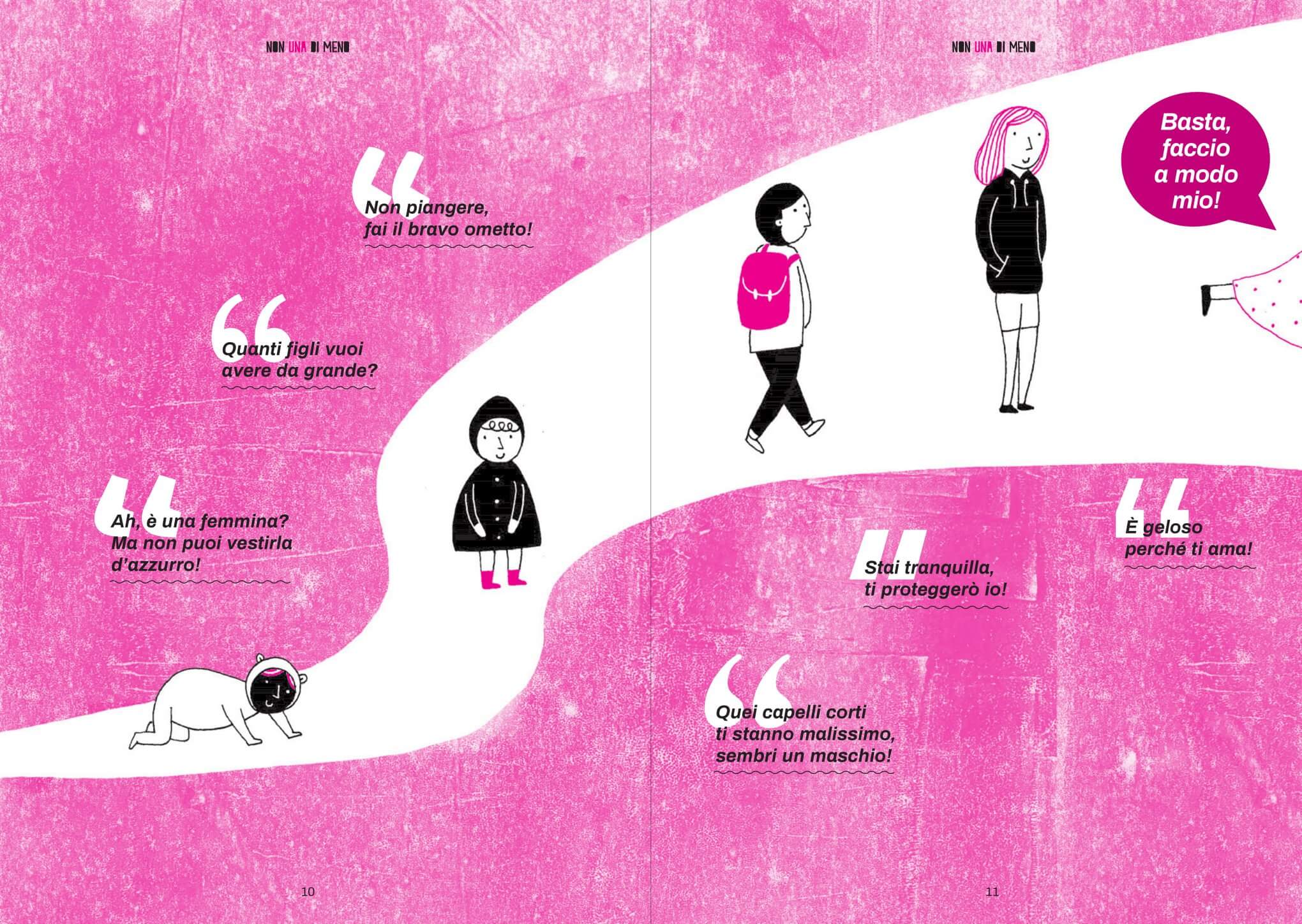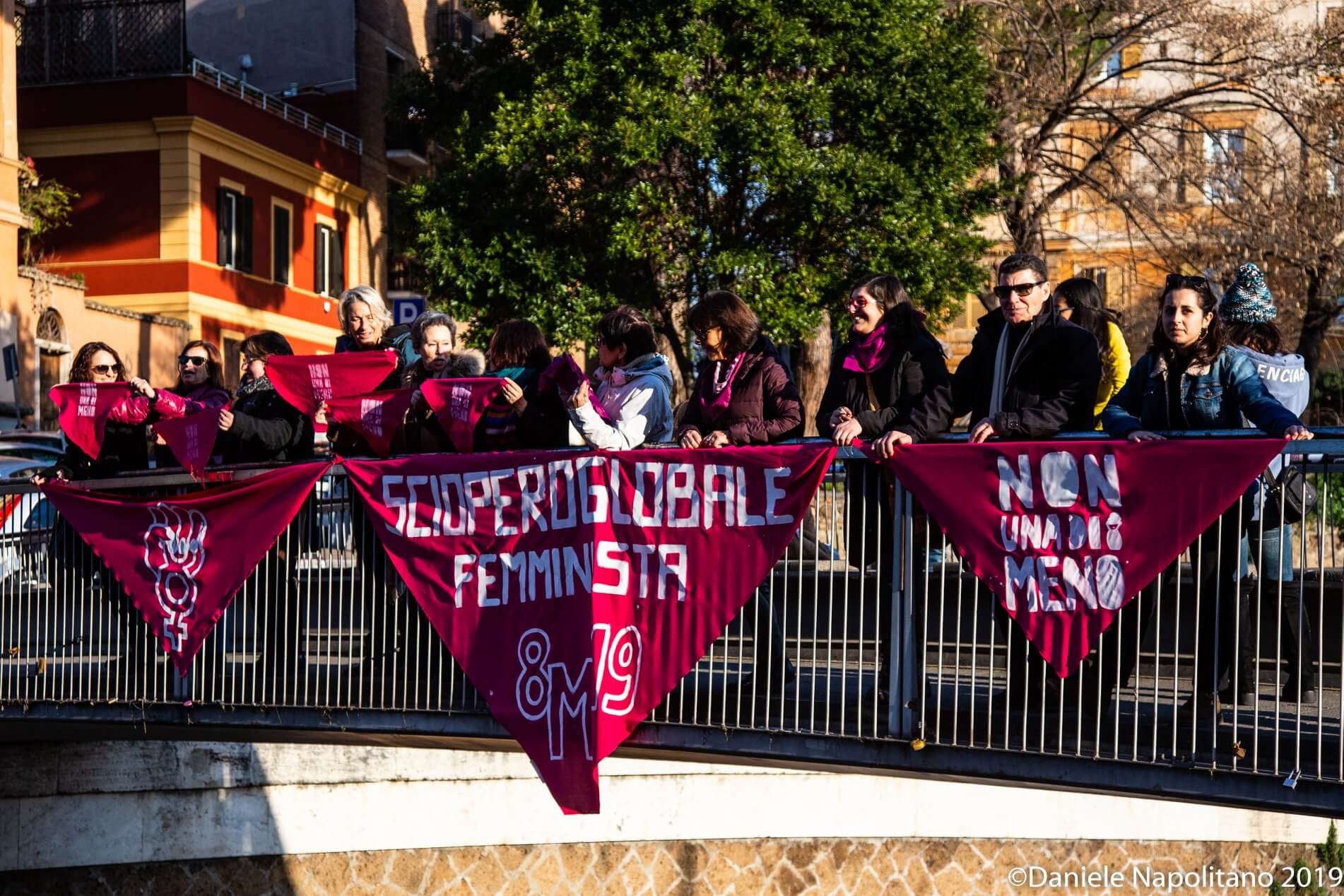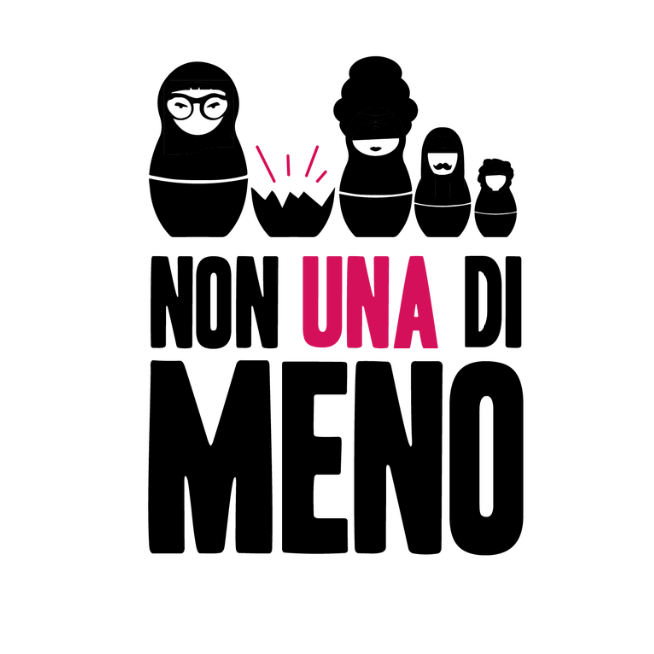Transnational Social Stike Platform is publishing the fourth «weekly striker» approaching the next global feminist strike on March 8th (see also nr. 1, 2 and 3). This weekly striker is dedicated to the experience of organization of Non Una di Meno (Italy). They spoke with Roberta Ferrari, who discusses the way in which the feminist strike has reactivated an unexpected process of mobilization also in Italy, drawing inspiration and force from the global wave of strikes against the intertwinement of patriarchy, neoliberalism and racism.
Since 2017, March 8th is not a women’s celebration anymore: a thorough and continuous process of organizing – made of national and local assemblies, demonstrations against male violence, institutional racism and precarization, initiatives in support of ongoing strikes and migrants’ struggles, meetings in the workplaces, and a constant political communication across the borders – is rapidly leading to 2019 feminist strike. In dozens of Italian cities, the strike will be, once again, a political tool which defies male violence, gender roles and identities, social, sexual and racist hierarchies. This year the strike will be a powerful way to contest the racist policies of the government and its patriarchal designs expressed in the Pillon bill on divorce and custody, but resonating in the neoliberal and neoconservative policies all around the world. The feminist strike calls for a transnational politics: the fight against the political, social and sexual conditions of exploitation questions the borders and demands the complete overturn of the present state of things.
Transnational Social Strike Platform: What political issues came up while organizing the strike? Among these issues, which ones were the most important? Which were your demands?
The feminist strike calls for a transnational politics: the fight against the political, social and sexual conditions of exploitation questions the borders and demands the complete overturn of the present state of things.
Roberta Ferrari: The first issue that the Italian movement Non Una di Meno (Not One [Woman] Less) faced was the redefinition of the strike as a political and social weapon for our struggle against patriarchal violence. We recognized this violence as rooted in our society at all levels, hence social violence presenting itself as sexual and gender violence, which affects women and at the same time intensifies everyone’s exploitation and oppression. As a consequence, we conceive the feminist strike as an occasion taken by women, that nonetheless allows all the subjects who are affected by patriarchal social violence to fight against this system of oppression. In 2016, there was an important debate concerning the “separatist” character of the strike. Without denying the political protagonism of women and GLBTQI+ subjectivities, the strike practically functioned as the chance to draw a line: everyone is called into question, in order to answer the feminist demands and to choose a side in the struggle against patriarchal violence.

The second important political issue we face is related to our urgency to show how this escalation of violence against women is related and connected to gender hierarchies, racism and precarization: sexual freedom, self-determination, free and safe abortion, free education and freedom of movement are not just our list of demands, but they constitute our concrete and interlaced fields of struggle. The neoliberal and conservative attacks against women and their freedom that try to re-impose the order of the patriarchal family all over the world are meant to increase precarity. The gender division of labor on an international scale intertwines with racism and with the exploitation of migrant labor, so that care and domestic work continue to be considered “women’s natural task”, to be performed for free or for a ridiculous wage, often by migrant women in a condition of isolation and under blackmail. At the same time, inside the workplaces, sexual harassment and racism are used in order to produce a completely available labour force. For all these reasons, we claimed that there cannot be feminism without antiracism.
The gender division of labor on an international scale intertwines with racism and with the exploitation of migrant labor, so that care and domestic work continue to be considered “women’s natural task”.
Our political demands have been collected in the Feminist Plan against male and gender violence. The Plan, which is a collective elaboration of discourses and practices against patriarchal violence in all its forms, constitutes neither a point of arrival nor simply a tool to negotiate with institutions. To “have a plan” — as we repeatedly shouted loudly during our initiatives, demonstrations and strikes — means for us to have a political perspective and a feminist program that aims to overturn the present social conditions. Among our main claims, we can mention here the demand for a basic-income and welfare for self–determination, a European minimum wage and a European unconditional residence permit for migrants, and a safe, legal and free abortion. These demands are particularly relevant today as a response to the neoliberal, patriarchal and racist policies of the Italian government ‒ and of many other governments in Europe and beyond. Thus, our demands turn the strike into an ongoing process, which does not end on the 8th of March and which allows us to meet and merge with other fundamental struggles. During our last national assembly in October, we called this process “A state of permanent agitation”, which has been fuelled by many important initiatives, such as a demonstration in Verona participated by thousands of people against the attacks to the freedom of abortion, the 200.000 demonstration in Rome against patriarchal violence and its racist and neoliberal faces, and the support of local – but really important – strikes like the one in December at Italpizza, in Modena, involving mainly migrant women.

TSS: How do you define the feminist strike? How do you deal with the question of connecting the different dimensions of the strike: social, political, industrial, reproductive…?
RF: As we said during our first strike in 2017, a feminist strike has to stop both production and social reproduction: if our lives have no value, we will stop. To strike meant for us not only to abstain from work but also to refuse our social condition, to reject gendered roles, to occupy streets and squares and unite all those who were reclaiming freedom from violence, racism and exploitation globally. Our political claims and our political work of involvement and communication aimed to break the distinctions between social, economic and political strike. This meant to recognize that these dimensions are interrelated. We wanted to involve those who could not strike and above all to reconquer the strike as a weapon, freeing it from the unions’ monopoly and restoring its political relevance. We established communication with workers of different sectors, from logistics to education, from factories to health services, without underestimating the difficulty of going on strike if working in extremely precarious conditions or under the blackmail of the residence permit. To stop productive and reproductive labour meant for us to interrupt the reproduction of the patriarchal society in all its forms, to refuse roles, positions and hierarchies. Therefore we called it a strike from and of genders.
This year we are also committing to the reproductive strike. Since the dismantlement and the privatization of welfare results not only in the precarization of the living conditions of everyone but also in the attempt to strengthen the sexual division of labour, the feminist strike becomes the possibility to uncover the invisible reality of domestic and reproductive work. Since care and service sectors become places of exploitation, characterized by low wages, precarious contracts and constant blackmail, with a massive presence of migrant women, the feminist strike is able to empower the struggles inside the workplaces, bringing them outside. The feminist strike also challenges the patriarchal foundation of reproductive labour and its neoliberal forms, therefore contesting laws, such as the one on separation and custody proposed by the Italian senator Pillon, which impose family and marriage as an unescapable destiny.
Non Una di Meno is showing the deep connections between patriarchy and racism and to lay bare the combination of neoliberal and neoconservative policies. To make these connections visible also means breaking fake coalitions among fictitious groups based on a conception of rights that reduce them to privileges for few, and, in this way, open a real space for radical critique and opposition to the present state of things. An opposition that does not surrender to any manipulation from institutional actors.
The feminist strike also challenges the patriarchal foundation of reproductive labour and its neoliberal forms, therefore contesting laws, such as the one on separation and custody proposed by the Italian senator Pillon, which impose family and marriage as an unescapable destiny.
In Italy the strike is an individual and constitutional right, even though the concrete possibility to strike is undermined by generalized precarity. Both in 2017 and in 2018 some grassroots trade unions – unlike the confederal ones – supported the strike on the 8th of March. This facilitated the participation of workers from warehouses, schools, factories, public administration and hospitals. But there is still more work to do: the feminist strike aspires to a continuous enlargement of the movement. Non Una di Meno is rooted in this process, which has been a global process since its beginning. Thus, its power depends on the capacity to maintain this level of the struggle, to find strategies to meet the challenge of the ongoing global feminist uprising without remaining caught in national specificities and problems.
This year we organizing assemblies in the workplaces, with the support of those unions’ delegates who are willing to mobilize for the strike, but also keeping in mind that the obstacles – be them technical, legal or created by the trade unions themselves – cannot stop us. Against the capitalist attempt to weaken the weapon of the strike, intensified by neoliberalism, we must respond persistently claiming the feminist strike as the answer.

TSS: What is your experience of organizing?
RF: NUDM is not a homogenous structure. There are different assemblies in many cities. This widespread organization is a point of force, but it is still important to create a common vision of the organization, to share watchwords and discourses. While at the beginning organizing was more a matter of technical or methodological issues, division of areas of intervention and distribution of tasks and so on, later we realized that effective organization means above all prioritizing a common and open political discussion and committing to the process of construction of common analysis. The first year we created 8 different working groups on various and interrelated topics. This organization has worked for building up a first common analysis and for writing the Feminist Plan, but the division into specific areas was subsequently abandoned to enable a more open discussion and to give more space to the connections between the different political issues. NUDM did not aim to become a network of groups, with their own interests and goals, but constitutes a heterogeneous movement able to organize itself across borders and differences, taking advantage of these differences. Our claims cannot be separated but make sense only by looking at their nexus. Broad political issues can be faced more productively by identifying crucial questions and maintaining the plenary as the space to create and verify a common political analysis. Also, we experienced positively the creation of a national coordination’s mailing list where all the local assemblies can communicate and share tasks, avoiding an excessive bureaucratization of the network, and leaving to the national assembly the function of sharing reflections on the political phase, discussing about the strike and the other initiatives of the movement, taking decisions on future steps. To keep the coordination structure as open as possible, while managing to take a crucial decision when needed, is a great challenge, but it is vital for the endurance and enlargement of the movement.
NUDM did not aim to become a network of groups, with their own interests and goals, but constitutes a heterogeneous movement able to organize itself across borders and differences, taking advantage of these differences.
TSS: How are you organizing the strike? Which strategies did you adopt to involve different employment sectors and to bring out the largest number of women to participate in the strike?
RF: Since the first strike in 2017 we have been mobilising both at the local and national level, always referring to the transnational dimension of the strike in our discourses and initiatives. We are involving workers from different sectors, migrants, students and anti-violence centres. We are organizing public assemblies and debates in different locations – workplaces, universities, social centres, schools – and spread the word through social media and flyers. Even after the first strike, we continued to meet once a week in public local assemblies. The effort is not only to organize meetings or public events just before the 8th of March but to create contacts and to trigger processes of involvement during the whole year: the strike becomes a process. At the same time, we are supporting and giving resonance to various struggles of women workers and migrants, participating to pickets, strikes, demonstrations and writing statements and political analyses, organizing public debates on the strike and its global dimension. We have taken all the opportunities to enlarge and foster our movement. It’s crucial not to reduce our movement – its discourses and practices – to the national boundaries since its power comes from a global uprising and this is what keeps it alive and vital.
TSS: How can we develop a transnational political communication and networking?
RF: The transnational focus is at the centre of our initiatives. Since its beginning, Non Una di Meno has been drawing inspiration and force from the global experiences of women’s strikes against male violence and for the freedom of abortion – for instance the Black Protest in Poland, the Strike for Repeal in Ireland, the Women’s March in the US, the green tide in Argentina. During our last national meeting, we discussed the importance of activating transnational coordination. The first step should be a transnational assembly aimed to exchange and share discourses and analyses, fostering the transnational organization of the feminist strike, in order to empower our movement and to show its global dimension. We think the transnational organization as a priority and we will work to make this possible.
***
This interview was originally published on Transnational Social Strike Platform. It has been republished here with permission.
![Political Critique [DISCONTINUED]](https://politicalcritique.org/wp-content/uploads/2015/09/Political-Critique-LOGO.png)
![Political Critique [DISCONTINUED]](https://politicalcritique.org/wp-content/uploads/2015/09/Political-Critique-LOGO-2.png)